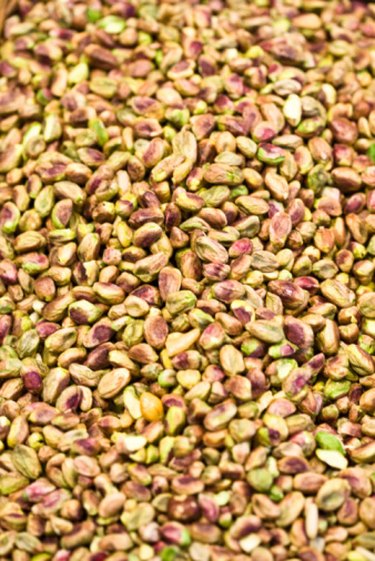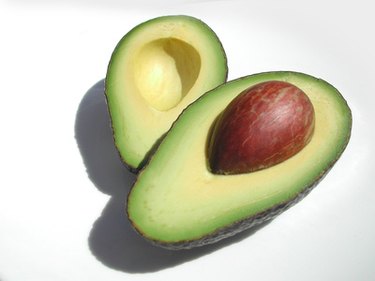
Seeds serve many purposes in the ground and at the dinner table. No single seed is exactly alike because all seeds have distinctive characteristics. Some seeds have a hard exterior shell with permeable pulp inside while other types of seeds are edible and easy to chew. The color also varies greatly depending on the type of seed.
Vegetable Seeds
Video of the Day
Vegetable seeds come in many different sizes and shapes. Cucumber seeds are light green tear-drop shaped seeds found within the spine of the vegetable. Carrot seeds grow within the foliage of the flowering part of the carrot. Carrots produce seeds when not harvested and allowed to flower. Carrot seeds are very tiny and black. Tomato seeds are wrapped in jelly inside the vegetable itself. Seed germination varies greatly from plant to plant, but most seeds need adequate water to germinate properly. Carrots are typically ready to harvest 80 days after being planted from seed.
Video of the Day
Flower Seeds
Flowers seeds vary greatly in shape, color and texture. Some flower seeds are black and look similar to vegetable seeds while others are cream colored or brown. The size also greatly varies. Some type flowers produce seeds that are much smaller than vegetable seeds. These seeds are easily blown around with the wind. The texture also changes greatly. Flower seeds are soft and penetrable or very firm.
Fruit Seeds

Fruit seeds come in many different sizes, shapes and textures. Each fruit has it's own unique type of seed. Avocado fruits have large seeds in the middle of each fruit. The seed is thick and shiny. Avocado seeds are high in omega-3 fats and other healthy oils. Peaches have a bumpy pit within the pulp of the fruit that can sprout into it's own peach tree is planted under the right conditions.
Edible Seeds
Some seeds are mass produced for human consumption such as sunflower seeds. These seeds are crunchy treats that provide the body with protein, b-vitamins and minerals. Other edible seeds include flax seeds, mustard, beans, cumin and sesame along with other types of nut and fruit seeds. Add edible seeds to salads, soups and other recipes. Most types of edible seeds are high in b-vitamins and protein, but each type has it's own mix of different nutrients. Almonds are higher in calcium while sunflower seeds have more b-vitamins. Many seeds are also rich in vitamin E.
- University of Missouri: Starting Plants Indoors From Seed
- Colorado State Univeristy: Storing Flower and Vegetable Seeds
- Math/Science Nucleus: Comparing Different Types of Seeds
- World Carrot Museum: Carrot Seeds
- Food Standards Agency: Pulses, Nuts and Seeds
- Global Oneness: List of Edible Seeds
- The World's Healthiest Foods: Sunflower Seeds
- The World's Healthiest foods: Mustard Seeds
- The World's Healthiest Foods: Cumin
- The World's Healthiest Foods: Sesame Seeds